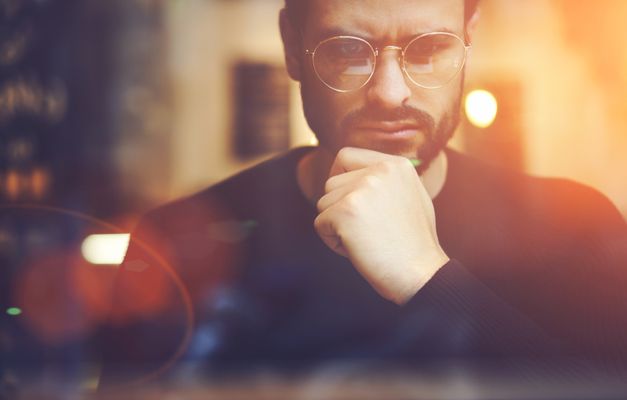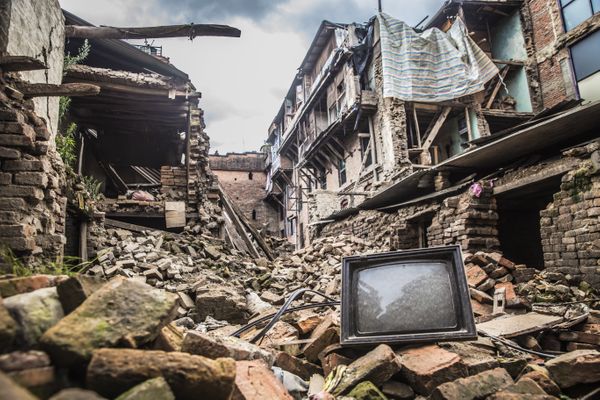4.2.1
Media Influence
Changing Media & Opinion Polls
Changing Media & Opinion Polls
The media influences voting behaviour through television, newspapers and the radio.


Role of the internet
Role of the internet
- The internet has played an increasingly important role in UK politics.
- Over 82% of households have internet access, which has led to more online media and online newspapers.
- MPs and political parties have used the internet more to connect with voters.
- MPs have their own websites where they outline the work and activities they have been involved in and look to communicate with voters.


Role of television
Role of television
- Television remains important for providing information and news to voters, with the televised election debates in 2017 watched by millions of people.
- Research by the Electoral Reform Society stated that a BBC Question Time Leaders’ show where both leaders spoke on tv and answered questions, helped 34% of voters to decide who to vote for.


Role of newspapers
Role of newspapers
- Newspapers remain important in shaping public opinion. Many people use these as their main news source.
- The Daily Telegraph often supports the Conservatives and The Guardian often supports Labour.
- Parties have looked to project a positive image of themselves and their leaders in the media.
- For example, Tony Blair hired a press secretary, Alastair Campbell, to ensure himself and the Labour Party were portrayed in the best possible light by the media during his time as PM.


Role of opinion polls
Role of opinion polls
- Opinion polls look to determine how citizens will vote in elections.
- Opinion polls are important in UK elections, with parties valuing their findings and conducting their own opinion polls.
- The exit poll asks voters who they have voted after leaving the polling station and is released on the night of the election results.


Accuracy of opinion polls
Accuracy of opinion polls
- Opinion polls have been inaccurate in past general elections, such as 2015 when it failed to predict that the Conservatives would win an overall majority.
- Reasons include ‘shy Tories’ who vote for the Conservatives but do not publicly admit to supporting them and the ‘boomerang effect’ where voters who saw Labour leading in the polls and did not support them turned out to vote.
- In recent years the exit poll has been more accurate.
- Polling firms include Survation, Ipsos MORI and YouGov.
Media Bias & Persuasion
Media Bias & Persuasion
Media coverage may favour certain parties over others and influence the public on who to vote for.


Media persuasion
Media persuasion
- The media can influence voting behaviour, however, the media alone is rarely a strong enough factor to change how people vote.
- The media often confirms people’s own political views as voters read papers that reflect their own political beliefs.
- The media does play a role because it can shape the political agenda through the way it covers issues and focuses on certain issues over others.


Media persuasion: case studies
Media persuasion: case studies
- The winning party at all recent general elections were supported by the majority of newspapers with most major national papers supporting the Conservatives in 2010, 2015 and 2017.
- In 1992 the Sun published a headline against Labour leader Neil Kinnock on the day of the election which stated ‘If Kinnock wins today will the last person to leave Britain please turn out the lights’.


Media persuasion: television
Media persuasion: television
- Television can have an important role in influencing people’s impressions and opinions of party leaders.
- Televised debates changed opinion polls in the 2010 election in favour of Nick Clegg.
- However, television rarely changes the political attitudes of voters and is more likely to reinforce their views as people watch information which aligns with their own views.


Media bias: newspapers
Media bias: newspapers
- Newspapers are partisan and biased in favour of certain parties and will support some parties whilst criticising others.
- Newspapers may change their allegiance depending on a party’s ideology and also changing circumstances.
- The Sun supported the Conservatives in the 2010 general election, however, supported Tony Blair in 1997 and supported Margaret Thatcher in 1979 because of her policies to weaken trade unions which suited the business interests of the paper’s owner, Rupert Murdoch.


Media bias: television
Media bias: television
- Television has more neutral coverage than newspapers.
- Parties are given agreed amounts of time for televised election broadcasts.
- Most tv channels are committed to being politically neutral.
1Democracy & Participation
1.1Representative & Direct Democracy
1.2Wider Franchise & Suffrage
1.3Pressure Groups & Other Influences
2Political Parties
2.1How Political Parties Work
2.2Established Political Parties
2.3Emerging & Minor Political Parties
3Electoral Systems
3.1Different Electoral Systems
3.2Referendums & How They Are Used
4Voting Behaviour & the Media
5Conservatism
5.1Conservatism: Core Ideas & Principles
5.2Conservatism: Differing Views & Tensions
6Liberalism
6.1Liberalism: Core Ideas & Principles
6.2Differing Views And Tensions Within Liberalism
7Socialism
7.1Socialism: Core Ideas & Principles
7.2Differing Views And Tensions Within Socialism
8The UK Constitution
8.1Nature & Sources of UK Constitution
8.2Constitutional Change since 1997
8.3Role & Powers of Devolved UK Bodies
9The UK Parliament
9.1Houses of Parliament
9.2Comparative Powers
9.3Legislative Process
10The Prime Minister & the Executive
10.1The Executive
10.2Ministerial Responsibility
10.3Prime Minister & the Cabinet
10.3.1Role of the Prime Minister
10.3.2Prime Minister's Powers
10.3.3Limits on the Prime Minister's Powers
10.3.4Role of the Cabinet
10.3.5Prime Minister & Cabinet: Relations
10.3.6Prime Minister & Cabinet: Balance of Power
10.3.7Prime Minister & Cabinet: Case Studies
10.3.8End of Topic Test - PM & Cabinet
10.3.9Top Grade AO3/4 - PM & Cabinet
11Relationships Between Government Branches
11.1The Supreme Court
11.2Parliament & Executive Relations
11.3The European Union & the UK
11.4Sovereignty in the UK Political System
12US Constitution & Federalism
12.1Nature of the US Constitution
12.2Principles of the US Constitution
12.3Federalism
13US Congress
13.1Structure of Congress
13.2Functions of Congress
14US Presidency
14.1Presidential Power
14.2The Presidency
14.3Interpretations & Debates of the US Presidency
15US Supreme Court & Civil Rights
15.1Nature & Role of Supreme Court
15.2Supreme Court Appointment Process
15.3The Supreme Court & Public Policy
15.4Protection of Civil Liberties & Rights
15.5Debates & Interpretations of the Supreme Court
16US Democracy & Participation
16.1Presidential Elections
16.2Electoral College
16.3Electoral Campaigns
16.4Incumbency
16.5Democrats & Republicans
16.6Internal Conflict & Ideology
16.7Support & Demographics
17Comparing Democracies
17.1Theoretical Approaches
17.2UK & USA Similarities & Differences
17.2.1Constitution: Nature
17.2.2Constitution: Provisions & Principles
17.2.3Federal System & Devolution
17.2.4Legislative: Lower Houses of Government
17.2.5Legislative: Upper Houses of Government
17.2.6Legislative: Powers & Functions
17.2.7Executive
17.2.8Supreme Court
17.2.9Supreme Court: Judicial Independence
17.2.10Civil Rights
17.2.11Civil Rights: Interest Groups
17.2.12Party Systems & Parties
17.2.13Campaign Finance & Pressure Groups
17.2.14End of Topic Test - Comparing UK & US
17.2.15Application Questions - UK & USA
18Feminism
18.1Feminism: Core Ideas & Principles
18.2Different Types of Feminism
19Nationalism
19.1Nationalism: Core Ideas & Principles
19.2Different Types of Nationalism
Jump to other topics
1Democracy & Participation
1.1Representative & Direct Democracy
1.2Wider Franchise & Suffrage
1.3Pressure Groups & Other Influences
2Political Parties
2.1How Political Parties Work
2.2Established Political Parties
2.3Emerging & Minor Political Parties
3Electoral Systems
3.1Different Electoral Systems
3.2Referendums & How They Are Used
4Voting Behaviour & the Media
5Conservatism
5.1Conservatism: Core Ideas & Principles
5.2Conservatism: Differing Views & Tensions
6Liberalism
6.1Liberalism: Core Ideas & Principles
6.2Differing Views And Tensions Within Liberalism
7Socialism
7.1Socialism: Core Ideas & Principles
7.2Differing Views And Tensions Within Socialism
8The UK Constitution
8.1Nature & Sources of UK Constitution
8.2Constitutional Change since 1997
8.3Role & Powers of Devolved UK Bodies
9The UK Parliament
9.1Houses of Parliament
9.2Comparative Powers
9.3Legislative Process
10The Prime Minister & the Executive
10.1The Executive
10.2Ministerial Responsibility
10.3Prime Minister & the Cabinet
10.3.1Role of the Prime Minister
10.3.2Prime Minister's Powers
10.3.3Limits on the Prime Minister's Powers
10.3.4Role of the Cabinet
10.3.5Prime Minister & Cabinet: Relations
10.3.6Prime Minister & Cabinet: Balance of Power
10.3.7Prime Minister & Cabinet: Case Studies
10.3.8End of Topic Test - PM & Cabinet
10.3.9Top Grade AO3/4 - PM & Cabinet
11Relationships Between Government Branches
11.1The Supreme Court
11.2Parliament & Executive Relations
11.3The European Union & the UK
11.4Sovereignty in the UK Political System
12US Constitution & Federalism
12.1Nature of the US Constitution
12.2Principles of the US Constitution
12.3Federalism
13US Congress
13.1Structure of Congress
13.2Functions of Congress
14US Presidency
14.1Presidential Power
14.2The Presidency
14.3Interpretations & Debates of the US Presidency
15US Supreme Court & Civil Rights
15.1Nature & Role of Supreme Court
15.2Supreme Court Appointment Process
15.3The Supreme Court & Public Policy
15.4Protection of Civil Liberties & Rights
15.5Debates & Interpretations of the Supreme Court
16US Democracy & Participation
16.1Presidential Elections
16.2Electoral College
16.3Electoral Campaigns
16.4Incumbency
16.5Democrats & Republicans
16.6Internal Conflict & Ideology
16.7Support & Demographics
17Comparing Democracies
17.1Theoretical Approaches
17.2UK & USA Similarities & Differences
17.2.1Constitution: Nature
17.2.2Constitution: Provisions & Principles
17.2.3Federal System & Devolution
17.2.4Legislative: Lower Houses of Government
17.2.5Legislative: Upper Houses of Government
17.2.6Legislative: Powers & Functions
17.2.7Executive
17.2.8Supreme Court
17.2.9Supreme Court: Judicial Independence
17.2.10Civil Rights
17.2.11Civil Rights: Interest Groups
17.2.12Party Systems & Parties
17.2.13Campaign Finance & Pressure Groups
17.2.14End of Topic Test - Comparing UK & US
17.2.15Application Questions - UK & USA
18Feminism
18.1Feminism: Core Ideas & Principles
18.2Different Types of Feminism
19Nationalism
19.1Nationalism: Core Ideas & Principles
19.2Different Types of Nationalism
Unlock your full potential with Seneca Premium
Unlimited access to 10,000+ open-ended exam questions
Mini-mock exams based on your study history
Unlock 800+ premium courses & e-books
